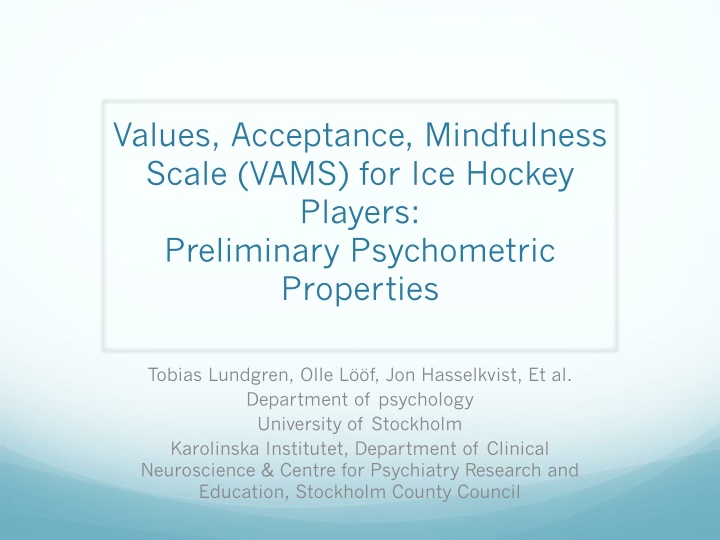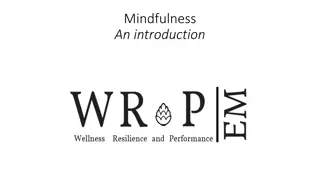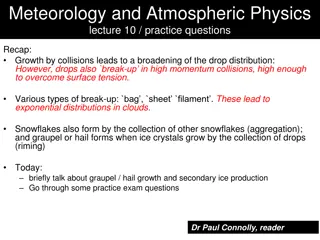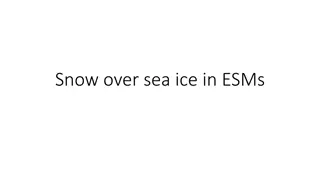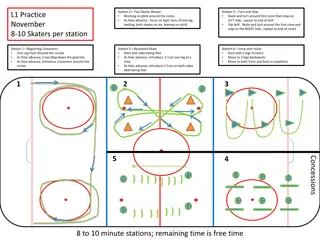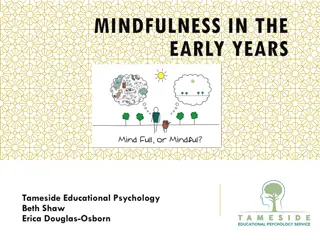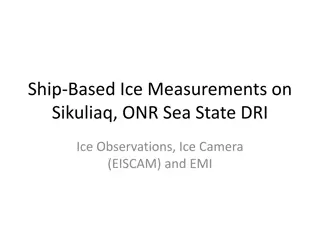Psychometric Properties of Values Acceptance Mindfulness Scale (VAMS) for Ice Hockey Players
Preliminary psychometric properties of the Values Acceptance Mindfulness Scale (VAMS) for ice hockey players were evaluated with a sample of elite senior, youth, and women players. The VAMS demonstrated strong correlations with quality of life, depression, anxiety, stress, and experiential avoidance. Initial versions contained 22 items, which were reduced to 10 items. The scale's utility was assessed through correlation analysis, factor analysis, and homogeneity tests, showing potential for measuring on-ice performance and unique variance among ice hockey populations.
Download Presentation

Please find below an Image/Link to download the presentation.
The content on the website is provided AS IS for your information and personal use only. It may not be sold, licensed, or shared on other websites without obtaining consent from the author.If you encounter any issues during the download, it is possible that the publisher has removed the file from their server.
You are allowed to download the files provided on this website for personal or commercial use, subject to the condition that they are used lawfully. All files are the property of their respective owners.
The content on the website is provided AS IS for your information and personal use only. It may not be sold, licensed, or shared on other websites without obtaining consent from the author.
E N D
Presentation Transcript
Values, Acceptance, Mindfulness Scale (VAMS) for Ice Hockey Players: Preliminary Psychometric Properties Tobias Lundgren, Olle L f, Jon Hasselkvist, Et al. Department of psychology University of Stockholm Karolinska Institutet, Department of Clinical Neuroscience & Centre for Psychiatry Research and Education, Stockholm County Council
Thanks to! MODO hockey Markus N slund, Per Svartvadet, Ulf Samuelsson, youth coaches, Players and my students Emil Jader
History AAQ correlates with and predicts a lot (almost everything) (Hayes et al 2006) As behavioral researchers, our goal is to get as close the target behavior as possible. AAQ specific measures has shown to be more sensitive eg epilepsy and diabetes etc (Lundgren, Dahl, Hayes 2008; Gregg 2004) Therefore a specific AAQ (VAMS) measure for hockey players was developed: Can ice hockey flexibility be measured and does it correlate with on ice performance?
Set-Up Participants Elite Senior players (39), elite youth players (34), elite women players (20) Total N=93 Self-rated VAMS, quality of life, depression, anxiety and stress Initial versions contained 22 items Final scale containtes10 items. (might have change after my last analysis) The scales utility was tested using: correlation analysis, Factor analysis and homogeneity tests.
Concurrent and predictive Validity
Preliminary result summary VAMS is highly correlated with Quality of life Depression Anxiety and stress, and general experiential avoidance On ice performance Data indicates that VAMS may be able to account for unique variance among ice hockey populations.
Items Factor 1 Factor 2 Factor 3 Flexible Attention Acceptance Valued Action .08 During matches I get nervous and it makes me not perform as well as I could I worry about not being able to control my nervousness When I think of training I get tired and it just feels tedious Worry get in the way of my success I am yearning for feeling the thrill of the game .09 .74(.56) .11 .80(.66) .10 .12 .42(.29) .32 .19 .23 .58(.37) .02 -.03 .49(.30) I yearn for trainings I yearn for games I can alway see alternatives in games and feel I have plenty of time to choose between different options Even when stressed during games I consider my options carefully .01 .04 .92(.94) .08 .11 .21 .59(.35) .91(.84) .22 .65(.48) .21 .08 I always have plenty of time in situations on the ice .70(.50) .08 .03 Eigenvalue 3,3 1,7 1,6 Mean of the communalities . Explained variance(%) Cronbachs alpha ( ) Mean of the scale SD of the scale ,64 33,2 .82 ,47 16,7 .74 2,74 1,20 .50 15,5 .65
Preliminary result summary: Factor Analysis Initial scale included 22 items Removal of non-functional and double loaded items produced a final 10 item scale. The scale was evaluated across three primary factors: Valued action Flexible awareness Acceptance. Reliability: Internal consistency = .8.
Intervention sensitivity tested in a controlled group trial for elite hockey players Participants Pre ACT Post ACT Cohen s d T-value P-value M (SD) VAMS M (SD) VAMS ACT-training13 1.04 2.83 .015 54 (9,4) 45,8 (6,1) Control group .02 .05 .96 8 50,25 (10,4) 50,5 (10,8)
Preliminary result summary: Treatment sensitivity VAMS is sensitive to interventions addressing experiential avoidance for hockey players.
Summary and Conclusions Although preliminary, the VAMS provides evidence for producing a valid, internally consistent and treatment sensitive scale for ice hockey players. More data is warranted to further evaluate the predictive validity of the instrument.
Thanks for your time Tobias.lundgren@psychology.su.se
